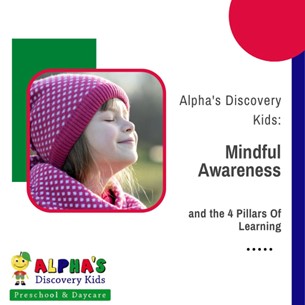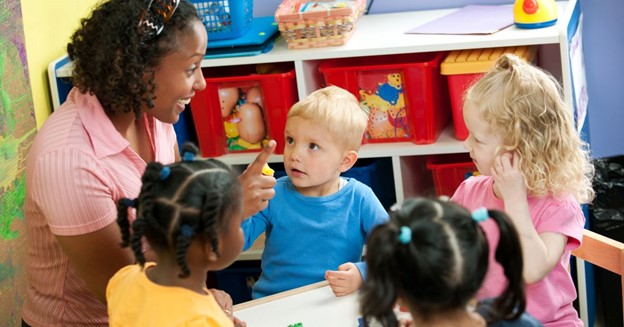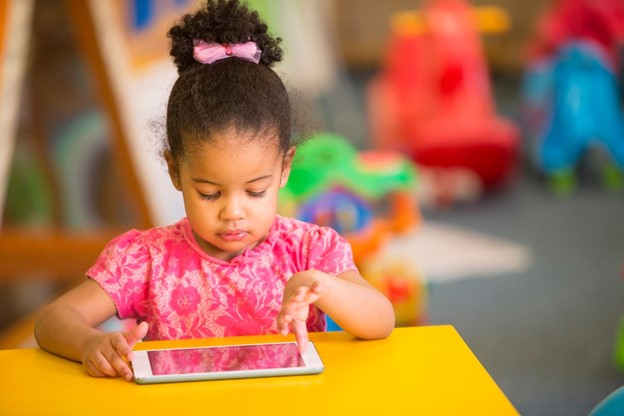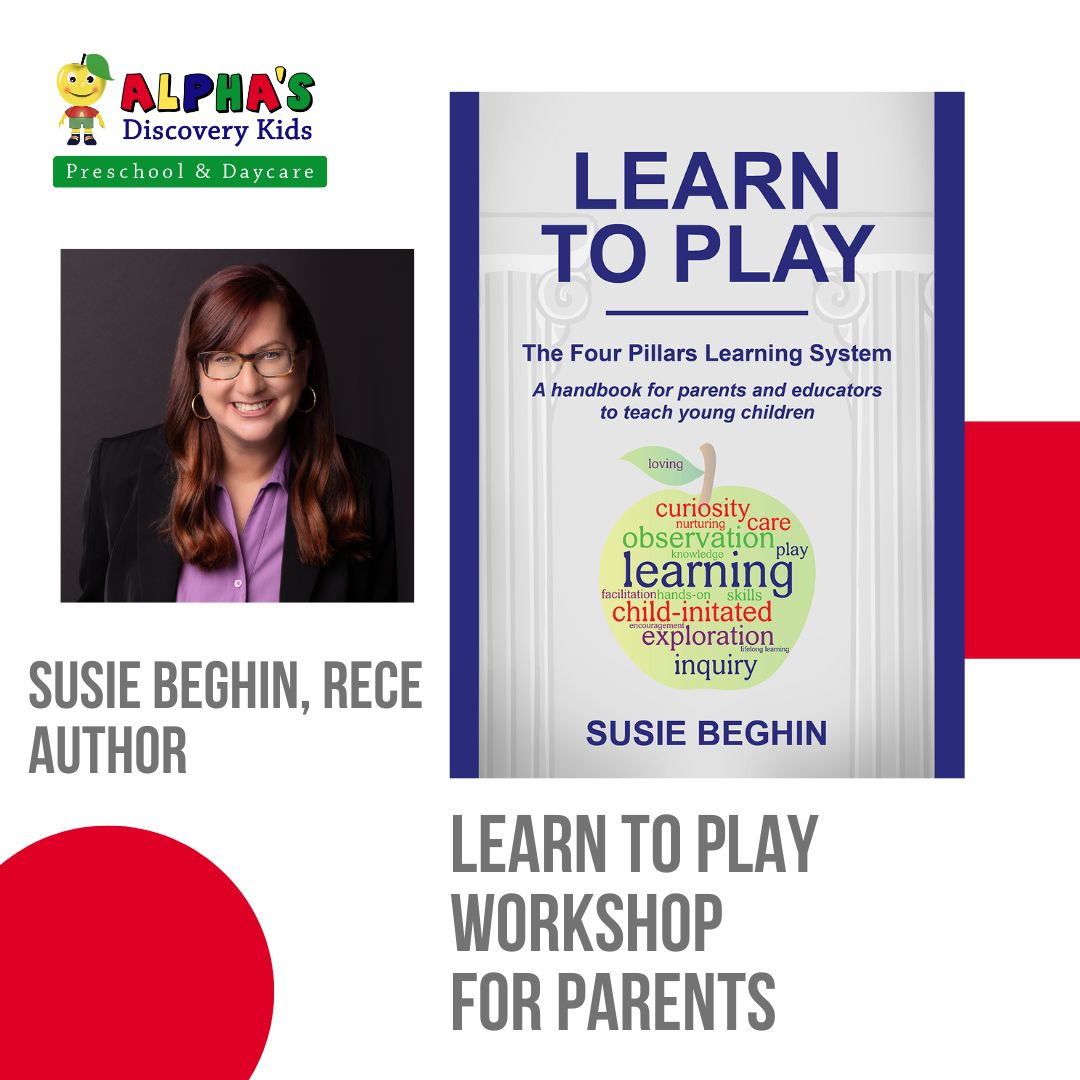Fostering Mindful Awareness in the Early Years
Fostering Mindful Awareness in the Early Years
by Susie Beghin, RECE, Founder of Alpha’s Discovery Kids
As I wrote my book, ‘Learn To Play’, my primary mission always centered around one core principle: providing children with the most exceptional start in life. And in my role as a mother and Early Childhood Educator, I have an unwavering commitment to help our children develop the critical skills essential to their lifelong success.
Parents and caregivers hold a unique position as the primary educators in a child’s life. At Alpha’s Discovery Kids, we’ve made it our goal to complement and enhance the invaluable work you’re already doing at home. We achieve this by expertly guiding children through our Four Pillars of Learning, ensuring that their learning experiences are not just educational but deeply meaningful.
Each pillar contributes to a well-rounded and holistic educational experience. Our pillars consist of Language & Literacy, STEAM (Science, Technology, Engineering, Art, and Math), Physical Activity & Nutrition, and Mindful Awareness,

Mindful Awareness
Mindfulness, at its core, is like a gentle embrace of the present moment, both inside and out. It’s about purposefully tuning into what’s happening right now without any judgment or the weight of desiring things to be different.
Mindfulness isn’t just a tool for grown-ups seeking to reduce stress, boost their well-being, and find their way back to calm amidst life’s storms. Its soothing benefits extend to the world of children, where worries and mental health concerns are increasingly common. By introducing mindfulness practices to children, we can offer them the same mental health gifts that adults enjoy. And, as an added bonus, it helps to nurture deeper connections between adults and kids, fostering open communication, empathy, and unwavering emotional support.
One of the most profound gifts that mindfulness imparts to children is the development of self-regulation skills. They learn how to navigate challenging situations, maintain composure, and return to a state of tranquility even in the midst of turmoil. These skills are instrumental in managing emotions, staying focused, paying attention, and blocking out distractions.
It’s quite fascinating when you watch babies and little kids. You’ll see something remarkable: they’re really good at being in the here and now. Children (usually under 4 years old) are experts at this. They don’t worry about what happened before, and they don’t fuss about what’s coming next. They simply live in the moment without making things too complicated. But as they get older, this natural skill often fades away. That’s where we, as parents and teachers, come in. Our job is to help them hold onto this wonderful ability.
The journey begins with us – the adults. We cannot effectively teach mindfulness if we are not willing to embrace it ourselves. To nurture mindfulness in our children, we first become mindful parents and educators. This means immersing ourselves in the practice and reaping the benefits it offers. Try being fully present with your child, as this helps them feel acknowledged and valued, nurturing their overall development. Active listening goes beyond just hearing words; it involves understanding the emotions, needs, and feelings behind what they say. Children often express themselves through their emotions, not just their words.
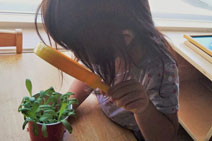
At Alpha’s Discovery Kids, mindful awareness permeates every aspect of our curriculum. We believe that mindfulness is not just an activity; it’s a way of life. It’s a way of being with children, nurturing their growth and well-being.
In our classrooms, mindfulness activities take various forms, providing children with tools to develop and sustain mindfulness throughout their lives. Here are some ways we incorporate mindfulness activities:
- The use of “calming jars” filled with sparkling glitter. By simply shaking and observing the falling sparkles, children engage their senses and return to the present moment.
- Deep breathing exercises, combined with gentle movements. These instill calmness in both body and mind.
- Activities such as the “5 Senses Exercise“, which encourage children to list things they see, touch, hear, smell, and taste, grounding them in the present moment.
- Provide lots of outdoor activity. Surrounded by the serenity of nature, children naturally feel a sense of calm. Nature walks, bird-watching, and cloud-gazing are just a few ways we integrate mindfulness into our outdoor experiences.
At Alpha’s Discovery Kids, mindfulness isn’t just a concept; it’s a philosophy. We understand that the early years of a child’s life are the most pivotal, and our commitment to their holistic development extends to nurturing their mindfulness. As we guide children to notice and appreciate each moment, both inside and out, we’re sowing the seeds for a lifetime of well-being, resilience, and happiness. Each child under our care is cherished as an extension of our own families, and their health and happiness remain our paramount focus.
For more information about early childhood education topics, check out my YouTube series.
To book a tour of one of our centres, please contact us .
The Importance of Socialization for Young Children: Nurturing Minds and Hearts
The Importance of Socialization for Young Children: Nurturing Minds and Hearts
by Susie Beghin, RECE, Founder of Alpha’s Discovery Kids
At Alpha’s Discovery Kids, we are passionate about providing children with an environment where they can learn, grow, and thrive. And we deeply understand the paramount importance of socialization in a child’s early years. It’s not merely about play; it’s a foundational element of a child’s development that shapes their future in profound ways. We recognize that children are inherently social beings, wired to connect, learn, and grow through interaction with their peers and caregivers.
As a parent myself, I understand how crucial socialization is to nurturing empathy, honing communication skills and learning the art of human interaction. In the ever-evolving landscape of early childhood education, we understand that the first six years of a child’s life are the most formative. It’s during this period that a child’s brain is in a state of rapid development, absorbing knowledge, experiences, and social cues like a sponge. As Early Childhood Educators, we are not merely caretakers; we are shapers of young minds and hearts.
To us, socialization is not a byproduct of our curriculum but an integral part of it. Alpha’s Discovery Kids understands that every child is unique, and their social needs vary. Some children may thrive in a bustling social environment, while others may need more gradual and individualized socialization experiences. Our approach is flexible, recognizing and respecting these differences, allowing each child to bloom at their own pace.

The effects of COVID-19 on socialization
The COVID-19 pandemic presented unprecedented challenges for children’s socialization. Social distancing measures, mask mandates, and lockdowns disrupted the traditional avenues for social interaction. Many children missed out on the crucial social experiences that daycare and preschool settings offer. Here are some of the effects we observed during this challenging period:
- Insecure Attachment Issues: When young children are unable to establish secure attachments due to limited social interaction, it can have devastating consequences for their emotional well-being. Secure attachments form the basis of healthy relationships later in life.
- Excessive Crying: Inconsolable crying can be a sign of distress caused by a lack of socialization. Children need the comforting presence of caregivers and peers to feel safe and secure.
- Language Delays: Language development relies heavily on social interaction. With masks obscuring our facial expressions and limiting verbal communication, we noticed that language delays became more prevalent among young children.
The Importance of Early Socialization
The longer children are isolated from social experiences, the harder it can be to reintegrate them into social settings like daycare. A 3-year-old who has been isolated for an extended period may face more significant challenges than a 12-month-old in adjusting to group environments. Early socialization sets the stage for a child’s future interactions and relationships, making it a critical aspect of their development.
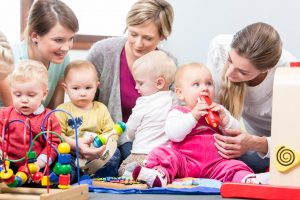
Three dedicated and happy young mothers sitting together on the floor, while watching their babies playing with safe multicolored toys at a modern playground for infants
Alpha’s Discovery Kids has observed significant advantages associated with socialization, and these benefits extend beyond full-time care. Even part-time attendance provides numerous advantages. Here are some of the benefits of socializing at daycare:
- Emotional Development: Children learn to identify and manage their emotions through interactions with peers and caregivers. They develop empathy, conflict resolution skills, and a sense of belonging.
- Cognitive Growth: Social play fosters cognitive development. Children engage in problem-solving, creativity, and critical thinking as they interact with others.
- Language Skills: Daily interactions with peers and teachers help improve language skills. Children learn to communicate effectively, expanding their vocabulary and language fluency.
- Independence: Socialization encourages independence. Children learn to make choices, solve problems, and take initiative in a supportive environment.
At Alpha’s Discovery Kids, every child in our care is treated as an extended part of our own families. We provide a nurturing and stimulating environment where socialization is a central focus. Our dedicated teachers, who are always patient, caring, and committed to making each child’s experience the best it can be, facilitate social interactions that promote growth and development.
We believe that socialization is not a luxury but a necessity for young children’s development. The pandemic underscored its significance, reminding us that socialization is vital for emotional, cognitive, and social growth. At Alpha’s Discovery Kids, we remain dedicated to providing a safe and enriching environment where children can thrive through socialization, guided by our Four Pillars of Learning. We are committed to empowering the leaders and innovators of tomorrow, one social interaction at a time.
For more information about how to use the Four Pillars of Learning system, check out Susie’s book, Learn To Play: The Four Pillars Learning System on Amazon.
For more information on early childhood topics, check out my YouTube series, or to book a tour, please contact us.
Young Children and Technology
Young Children and Technology
by Susie Beghin, RECE, Founder of Alpha’s Discovery Kids
At Alpha’s Discovery Kids, we recognize the world is an ever-changing place. And with technology continuing to evolve in leaps and bounds, our young children are even more technologically advanced than we could have ever imagined.
This is part of the reason why I wrote my book, ‘Learn To Play’. I wanted to share my knowledge and learnings that I have personally acquired during my time as an ECE educator and a mother. It is important that I share what I know about how children learn with other parents.
At Alpha’s Discovery Kids, we teach kids using our 4 Pillars of Learning curriculum in a way that is playful and fun. Our 4 Pillars of Learning include: Language & Literacy, STEAM (Science, Technology, Engineering, Art and Math), Physical Activity & Nutrition and Mindful Awareness. When I was developing the 4 Pillars, I wanted to ensure I created a program that meets a child’s needs from physical, cognitive, social, emotional and spiritual well-being.
In this article, I want to focus on technology and how it can play a valuable role in young children’s development.
Technology (the second part of STEAM)
Technology is at the core of mostly everything we do nowadays. When we hear the word “technology,” the first thing that often comes to mind is screen time. However, at our daycare, technology is so much more than that. We embrace technology as a tool that enhances learning, fosters parent involvement, and creates exciting opportunities for children to explore the world around them.
Technology as a Resource Tool:
In our classrooms, we utilize iPads as resource tools, opening up a world of knowledge to young minds. For example, when learning about the solar system, we can access captivating videos that visually depict the planets, enabling us to teach complex concepts in an engaging and interactive manner. Technology becomes a catalyst for exploration and discovery, enhancing the learning experience for our children.
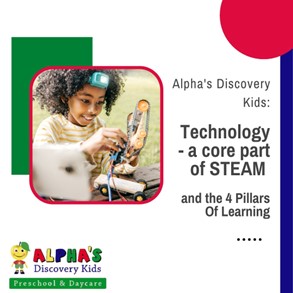
Connecting with Experts and Resources:
Through technology, we have access to a wealth of experts and resources. Whether it’s inviting guest speakers via video conferences or conducting virtual field trips, we can bring diverse perspectives and experiences directly into our classrooms. Technology enables us to expand our horizons and expose children to a vast array of knowledge and expertise.
Communication and Parent Involvement:
One of the most remarkable benefits of technology in our daycare is the ability to record and share children’s daily activities. Through our app, HiMama, we capture videos, photos, and data, documenting each child’s progress, meals, sleep patterns, bathroom breaks, and educational milestones. This instant and real-time information empowers parents to stay involved in their child’s daily life, creating a strong connection between the daycare and home.
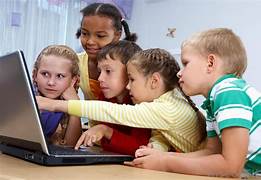 Research and Exploration:
Research and Exploration:
Technology serves as a gateway to endless knowledge. When children have questions or curiosities, we can use technology to conduct research together. For instance, if we want to delve into the fascinating world of polar bears, we can easily access factual information, statistics, and even watch videos about their habitats and behaviors. This interactive approach instills a love for learning and nurtures children’s natural curiosity.
Creativity and Play:
Technology also has a role in fostering creativity and imaginative play. We incorporate music into our classrooms, utilizing technology to play songs and create a lively atmosphere. Additionally, we encourage children to explore their creativity by using technology to record and produce their own little videos, allowing them to express themselves and share their experiences with others.
At Alpha’s Discovery Kids, technology is not a mindless tool for entertainment; it is a purposeful and valuable asset that enriches the learning environment and strengthens the bond between parents, children, and educators.
We harness the power of technology to empower children, promote active learning, and create a sense of involvement and collaboration among parents. Technology opens doors to a world of knowledge, ensuring that our children are equipped with the skills and curiosity needed to thrive in the digital age.
By combining multiple aspects of STEAM every single day, our educators at Alpha’s Discovery Kids are able to teach multiple concepts in one lesson. And STEAM is a pivotal part of this learning.
For more information on our 4 Pillars of Learning, or to book a tour, please contact us at https://www.alphasdiscoveryclub.com/contact/ or call us at 905-823-8257.
Learn to Play Workshops: For Parents
Learn to Play Workshops: For Parents
Susie Beghin wants to give children the best start in life. It’s why she founded Alpha’s Discovery Kids in 2012, a daycare and preschool dedicated to providing quality education and a positive learning environment.
Now, Susie shares the foundation of Alpha’s Discovery Kids’ beloved and celebrated inquiry-based curriculum in her new book, Learn to Play: The Four Pillars Learning System.
Learn to Play: The Four Pillars Learning System, is a must-read for all parent-to-be or parents with young children! In the book, Susie shares her teaching method with parents and educators as a tool for learning both at home and in the childcare setting. For each pillar of learning, there are strategies on how to build skills as well as sample free-play and intentional play activities – by age group, from infants to preschoolers.
Susie is now offering workshops to teach the fundamental concepts in the book for parents who want to learn how to teach their kids through play. She is inviting parents to participate in the free workshop to explore the book in a hands-on learning environment. Note: parents must purchase the book to enroll in the free workshop.
The workshops will be held monthly at the following location:
Alpha’s Discovery Kids – Mississauga
6435 Erin Mills Parkway E-02 Mississauga, ON L5N 4H4
Tickets available on EventBrite. Click here to book tickets.

